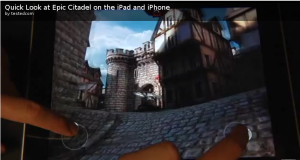Throw away your Nintendo Gameboy and Sony PSP. Serious mobile Android gaming systems are on the way. Tegra 2 processors appear to be the silver bullet heading for the heart of the mobile gaming industry. The article from “Android and Me” below suggests they might be as much as five times faster than current graphics processors in Android phones. Destructible environments, mesh slicing, ray tracing… Bring it on!
http://androidandme.com/2010/11/games/this-is-what-games-will-look-like-on-honeycomb-tablets-video
Even home consoles aren’t safe. Google is targeting televisions with their new Google TV products. The replacement of home consoles with Android games is still a few years off because beefy Android systems have not been produced yet. The games are just starting to utilize all the resources on mobile devices.
http://www.google.com/tv/features.html
I would be pretty nervous if I were Microsoft, Nintendo, and Sony. Their revenue from games, portable gaming devices, and console sales are at risk. I’m really surprised that Sony is building Google TV’s. Maybe they will survive the Android Gaming Revolution by partnering with Google. It seems like it would be mutually beneficial to combine future Sony PlayStation technology with Android. PlayStation could easily play all the Android Market games and still provide hardcore gamers with other options for store-bought content.
Here are some of the challenges that Google needs to address before the Android gaming revolution takes place:
- Controls
- Nothing beats hardware controls in gaming. Google needs to create a standard API for plugable hardware controls through the mini USB interface found on Android phones Below is one example of a small hardware joystick that might work.
http://www.hvwtech.com/products_view.asp?ProductID=145&utm_source=Google&utm_medium=Product+Search&utm_campaign=Product+Search+%28Nov10%29 - Touch screens do not provide the necessary affordances for gaming. What affordances do the controls in Epic Citadel provide? A novice user might see the circular areas and press them, expecting them to afford pushing (like a normal button).
- Incorrect mapping from actions in games to controls. How do I move forward in my first person shooter game? A user might not understand that movement requires a press, hold, and slide gesture. The carry-over of the two joystick concept from console gaming to touch screens is not effective. Just because games have been doing it for a long time with hardware does not mean it should be applied to touch screens. Is it possible to hold a device with two hands, move around in the scene, look around in the scene, and perform another action (e.g. open a door)? I’ve been doing that in first-person games for as long as I can remember.
- Nothing beats hardware controls in gaming. Google needs to create a standard API for plugable hardware controls through the mini USB interface found on Android phones Below is one example of a small hardware joystick that might work.
- Communications
- Consoles have game player matching systems (e.g. XBox Live). Google needs to create a game matching system for Android gamers. It gets a little trickier for Android. GPS information could be used to match players. Also, different communication methods are possible: 3G/4G, Wi-Fi, Bluetooth, etc… Google should create a service for matching players and finding the best available communication method.
- Display
- How can all the information about the state of a game be presented to the user in a meaningful way on a small screen? Users need to be informed about what is going on in the game in a short amount of time.
- Graphics engines need to be ported and developed for Android. Most graphics engines are written in C/C++ and require quite a bit of work to port them over to Android. The “Android and Me” article at the top of this post suggested that Unreal is working on porting their engine to Android. Hopefully, the Disgruntled Rats can release their lightweight “Phantom” graphics engine for Android before Unreal gets theirs out the door. 🙂
- Affordability
- Why would anyone spend $500+ on an Android phone just to play games? Portable Android systems need to be developed at low cost, without phone plans. Wi-Fi would work fine for accessing the Android Market on these devices. These devices need to be marketed as gaming systems and sold next to other portable gaming systems at Walmart and Target. Once these devices are built, they will be popular on Christmas shopping lists.
- Google TV looks promising for future TV’s, but many people already have high-definition televisions. Having a built-in Google TV PC isn’t enough to encourage people to spend money on an upgrade. More external Google TV boxes need to be developed. I know two exist; they are not competitively priced at this time (~$400).
What do you think? Is the Android Gaming Revolution coming? When will portable gaming devices be replaced by Android hand-helds? How many years until Android becomes a home console gaming platform? I look forward to your comments and discussion.

Mike, great article. You show some great insight into the future and I think you’re right on. The industry is changing under our feet whether we like it or not, and thankfully we have a guy like you on our team who can smell what’s cooking before it shows up on the table.
I also think you’re right on with the controls. I imagine there’s nary a gamer (console or PC) who thinks that the limited touchscreen control could possibly survive the longhaul over the precision and multi-tasking ability given by keyboard/mouse or console controller. Especially in first-person shooters where precision and fluid movement is.. well.. everything. The idea of pushing out an API to implement 3rd party mini-usb controllers is great and needs to occur before people take droid FPS gaming seriously, or even moderately so.